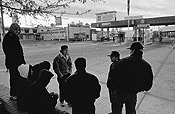
This is a picture of men standing outside of the enterance to the
border.
They are on the Mexican side of the Arizona-Mexico border.

This is a picture of men standing outside of the enterance to the
border.
They are on the Mexican side of the Arizona-Mexico border.
Even though Mexicans immigrate to the United States they still maintain a Mexican pride. In the U.S. Mexican immigrants continue to celebrate the holidays that are celebrated in Mexico. But sometimes the children of these immigrants are so immersed in American culture that they consider themselves more American than Mexican. The first aspect of the Mexican culture that the immigrant generation loses is language.
This corrido deals with the issue of alienation in North America. Most likely, the protagonist came to the U.S. to improve his/her life. Although, he may be earning more mondy in America than he would in Mexico he is not happy. He must hide from immigration officials and he can no longer communicate with his children because they are americanized. The protagonist feels that he is in a gilded cage because even though earns a good wage he can not live life freely.
The author of this corrido had immigration problems of
his own. When Enrique Franco wrote this corrido he himself was an
illegal immigrant. "[Immigration] had never been treated as a social
problem," said Franco. "I never had the problem of communication
with my children, but many immigrants do. There isn't time to talk to the
kids. The children learn another language. That's where the gap between
kids and parents begins." Even though groups like los Tigres may
have not experienced all the problems of illegal immigration they have
close friends who do.